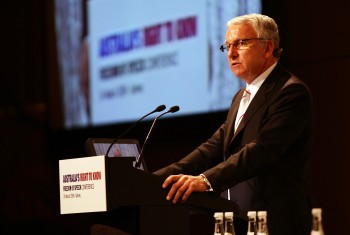Guest posting: The media is far from perfect but we protect Australia’s right to know
Yesterday saw the Australia’s Right to Know conference on freedom of speech. It was opened by John Hartigan, CEO of News Ltd. This is what he had to say:
We are here because we care about some of our most basic freedoms. Freedoms that most Australians take for granted. Freedoms that most Australians don’t know have been seriously eroded over the past quarter of a century of more.
 The journey here today has been a long one. In 1976 Prime Minister Malcolm Fraser said: “If the Australian electorate is to be able to make valid judgements on government policy it should have the greatest access to information possible”.
The journey here today has been a long one. In 1976 Prime Minister Malcolm Fraser said: “If the Australian electorate is to be able to make valid judgements on government policy it should have the greatest access to information possible”.
That was six years before Australia introduced freedom of information laws that were designed to uphold our rights to know how we are governed.


I’d like to comment – but I am bound by a secrecy clause.